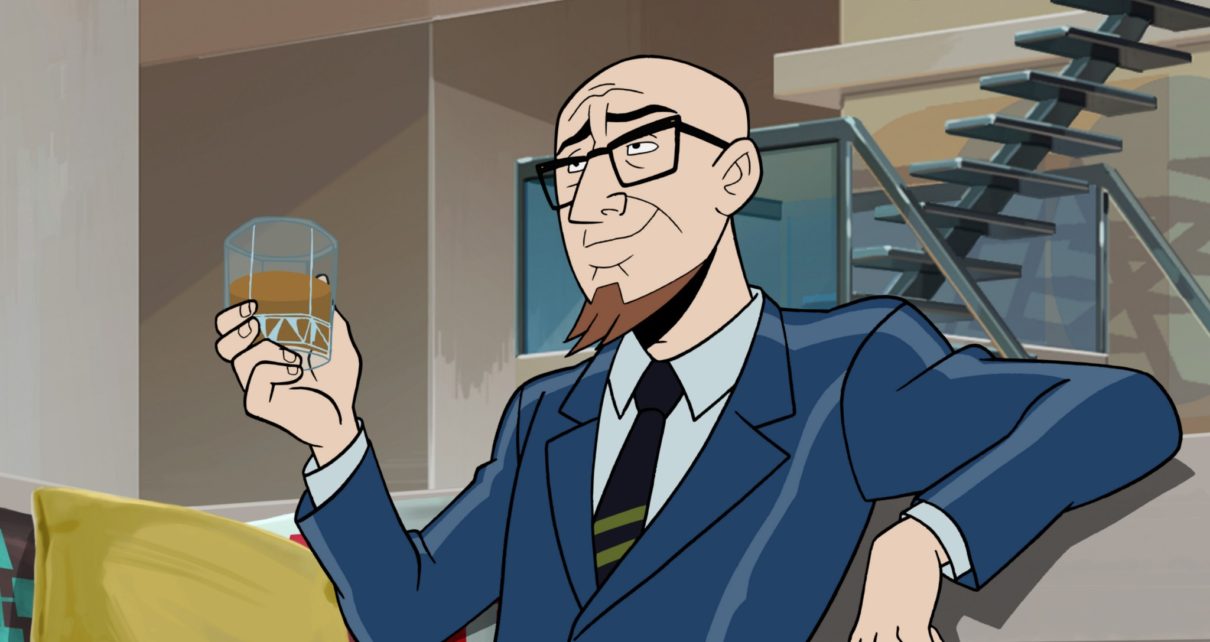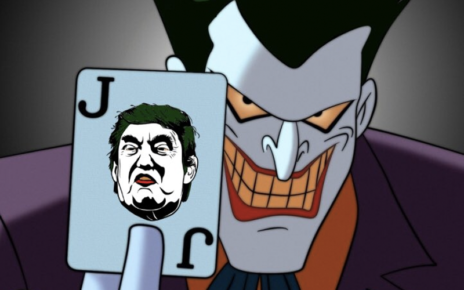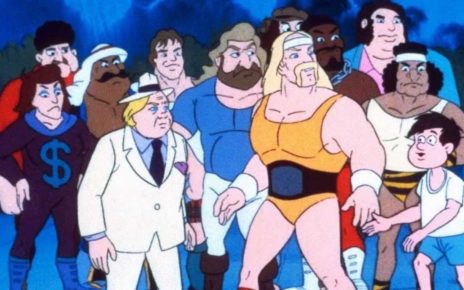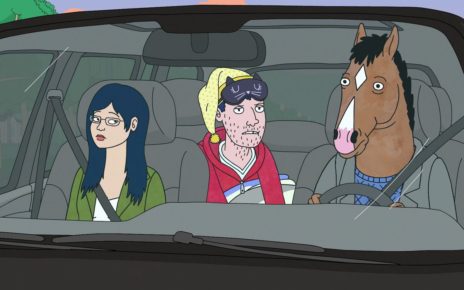Is this the golden age of adult animated television? And if so, what brought it about? If you’re a grown-up cartoon junkie like me, you could probably be forgiven for thinking BoJack Horseman and Rick & Morty are responsible, considering all the thinkpieces that look like this and this and—actually, no, you couldn’t. The idea that one of those two (stellar! magnificent!) shows, or Archer, or Bob’s Burgers, or some other current rated-MA toon with a cast as sharp as its wit deserves credit for the current wave of serial animated brilliance is total horse[man]shit. It’s The Venture Bros. Full stop.
“We never set out to make just a simple parody of Jonny Quest,” said The Venture Bros. co-creator Jackson Publick in an interview with The Dot and Line this week on the show and its long-anticipated seventh season, now airing on Adult Swim. “But I don’t think a show would last very long if it didn’t evolve.”
And it did…into the best, most important mature cartoon on the air. And OK, I’m coming in hot. But really, can you blame me? The phrase “golden age of American animation” is so outrageously overused at this point that you can find headlines from 20 years ago proclaiming the same thing. And you know—yeah, look, we kinda are! Between the absolute crystalline brilliance of the Looney Tunes and the wave of genius shows that took Cartoon Network and Nickelodeon by storm beginning in the early 1990s that birthed an era that gave us Avatar: The Last Airbender and Adventure Time and just keeps on giving, there was a whole lot of crap (read: cartoons custom-built to sell action figures) punctuated by the occasionally great exception (read: Hanna-Barbera at its best). Yes, I’m generalizing. But so is the phrase “golden age.” And generally, it’s all true.
If you liked this story, sign up for our newsletter.
Which is why when Mike Lazzo and company conceived of Space Ghost Coast to Coast in 1994 and moved it, in 2001, to the brand new Adult Swim, they started a mature toon chain reaction that couldn’t be stopped. No, Adult Swim wasn’t responsible for the creation of adult animation—Ralph Bakshi’s work was already on the silver screen, for one, and on the small screen, Daria, Beavis and Butthead, The Critic, South Park, and The Simpsons were all making their mark, leading to the successes of King of the Hill, Futurama, Family Guy, and the like. (If the sheer number of great adult animated shows just listed off doesn’t put the clickbaity fervor of Horseman/Sanchez worship into perspective, I don’t know what will.) But with Space Ghost came, in the network’s first lineup, Aqua Teen Hunger Force, and Sealab 2021—whose creator, Adam Reed, went on to create Frisky Dingo and Archer—and The Brak Show, and Harvey Birdman, Attorney at Law (which, to much rejoicing, is coming back, sort of).
Those shows, with their wholesale lifting of characters from old Hanna-Barbera cartoons and willing to push the boundary of what was “appropriate for a cartoon” further than any cartoon before them than South Park, proved to be the perfect cocktail for The Venture Bros. This was a show released in Adult Swim’s second lineup that began as an irreverent Jonny Quest parody and yet would become, in my opinion, the smartest, most complex, most wide-ranging adult cartoon of them all. Because The Venture Bros. brought to the table, among other things, two innovations none of those other shows that came before it had: serial worldbuilding and true emotional attachment to its characters.
Now, The Venture Bros. is back, even as the critical gaze stays firmly fixed on Rick & Morty — a show that could be described as Venture Bros. fan fiction gone right as surely as it could be described as Back to the Future fan fiction gone wrong. (Publick loves it, by the way: “Every time I see Rick & Morty, I’m like, ‘that’s a damn good show.’ I know it’s not original to say that.”) So while critics ask if today’s two hottest toons are proof we’re in the golden age of adult animation, I’ll ask something a bit more to the point: What did Rusty Venture ever do to you?
Here, in my words and in Publick’s, is what he—and Brock Samson, and Dean and Hank Venture, and Dr. Girlfriend, and the Monarch, and Dr. Byron Orpheus, and Henchman 21, and the whole dang gang—did for you. And for animation. And for BoJack Horseman, and Archer, and Rick & Morty.
Don’t you dare forget it.
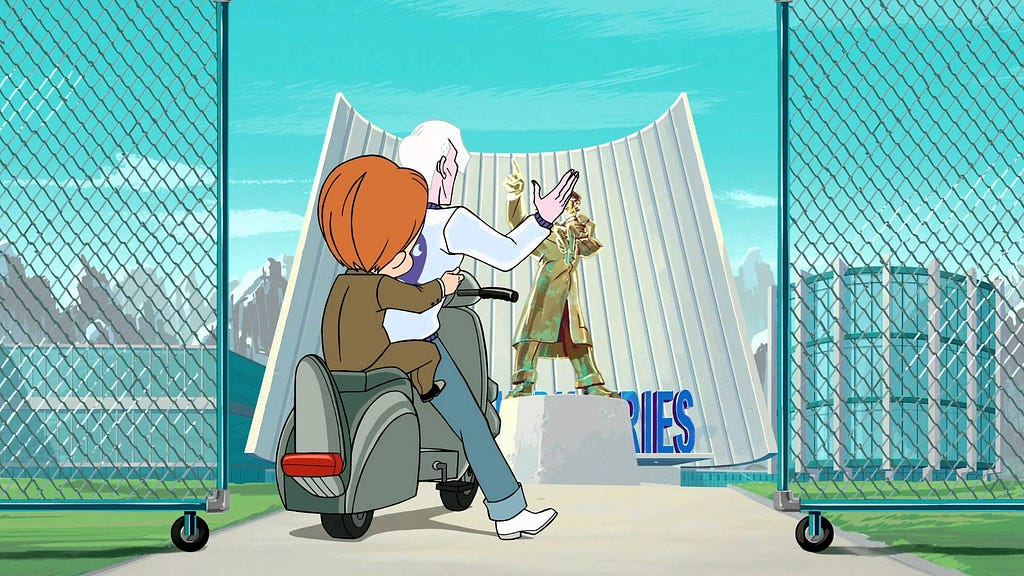
A Continuity Worthy of Prestige Television
Shows like Twin Peaks, The Sopranos, The Wire, and the like are frequently praised for bringing seriality to the small screen in ways no shows before them ever had—that is, making seriality inextricable from understanding and enjoying the show itself. Arrested Development has gotten credit for doing the same for the comedy genre, and specifically the sitcom. In the animation world, anime has been doing this for ages, but in American cartoons, that trend was almost nonexistent until The Venture Bros. came out in 2004. (In children’s animation, Avatar: The Last Airbender was similarly influential when it came out on Nickelodeon in 2005, borrowing from Japanese animation in ways that shows Adventure Time would go on to codify.)
The show’s creators, Publick and Doc Hammer, made absolutely certain that their decisions mattered for the show as a whole. Some of that was just background—if, for instance, a building is destroyed in one episode, Publick said, it would stay rubble in the next. Sometimes that continuity is even hinted at in the show’s references. The first episode of the latest season, “The Venture Bros. and the Curse of the Haunted Problem,” which heavily refers to the second episode in the show’s history, “Careers in Science,” makes copious nods, for instance, to the largely forgotten early 1980s Burt Reynolds vehicle Sharky’s Machine, precisely because the earlier episode had made one, too. “It’s a weird one, but we made the mistake of making that reference fourteen years ago, in the second episode, and now we’ve got to stick with it,” Publick said. “Now I have to make something of it.”
But the show’s main plot, too, revolves around its continuity, and only gets more serial as the show goes on. An example: one of the characters Hammer voices, Billy Quizboy, has a metal hand and an eyepatch. For two seasons, that was just a visual touch that got the occasional nod in dialogue as a one-off joke. But in the third season, Publick wrote an episode, “The Invisible Hand of Fate,” that explained its importance in the mythology, and Billy’s inextricable ties to the Venture Family. That episode relied on those that came before, and was important in those that came after. Which doesn’t mean that, as a genre show, The Venture Bros. can’t just blow it all up and start over. It has, at least twice. But those are important in-universe, too—a sort of Crisis on Infinite Earths, but funnier.
Shows like BoJack Horseman, Archer, and Rick & Morty would all eventually do this to one degree or another. But Venture was the pioneer. And for his part, Publick attributes much of this to his network and its willingness to let them do what they want.
“I’m super lucky that we got to be on Adult Swim, and one of the first half-hour shows,” he said. “We got to open things up a little more than some of those other shows. They’re doing 11 minutes — they’re sort of built as gag machines. And without them, we wouldn’t exist, but we took it where we instinctively needed to go to keep it interesting for ourselves. We’ve gotten older while we’ve been making it, and gotten better at some things that we do, and so the things that we’re interested in are different than what they used to be. We have more grown-up lives now, we’ve probably been to more therapy. Like Archer — Adam Reed came out of the same stable we did and moved onto what he needed to do. Nobody ever told us we couldn’t do it. It was only after doing it that we would take a step back and go, ‘I don’t think anybody else is doing this!’ So it’s cool that Adult Swim just let us follow our own instincts, and maybe other people went, ‘Hey, we can do that now!’”
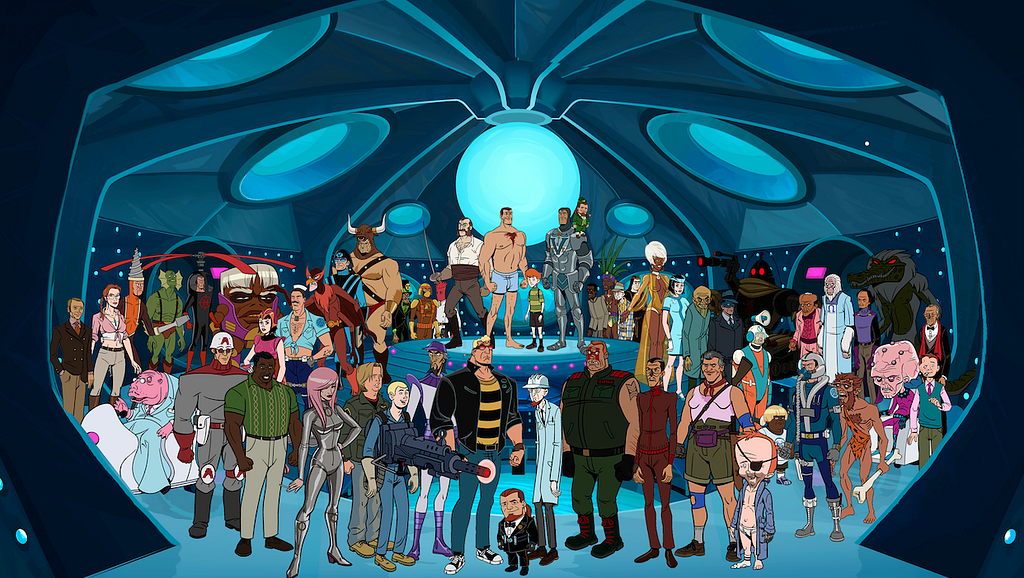
The Most Complex and Witty Fictional Universe on TV
This is, honestly, mostly an addendum to the previous point. But it’s worth making on its own! This is a show that has as deep a bench of heroes and villains as the Marvel Cinematic Universe—generations of heroes and villains, each tied to the next through blood or friendship or scientific experiments gone horribly wrong—that keeps on growing and never forgets a face. It’s incorporated real-life characters—Mark Twain, for instance, and Nikola Tesla—alongside Sean Connery parody Colonel Gentleman, Hunter S. Thompson parody Col. Hunter Gathers, and “The Sovereign,” a shapeshifter who typically takes on the form of David Bowie. (Iggy Pop and Klaus Nomi make appearances, too.)
And that’s just a few of the characters who are pop culture references. The original character concepts, which themselves often riff on some of the more ridiculous comic book heroes and villains, are just as punchy. Take gentleman villain Phantom Limb, for instance—a supervillain with invisible arms and legs. Or one of the long-unnamed background characters, a villain who boasts a floating, pixellated head. This season, Publick said, he finally named him—something he was prepared for. “It’s Han Solo’s backstory constantly. We always made a point of trying to make background characters look interesting, because they might have a story.” (Think BoJack’s background animals.) The name? “Hate-bit.”
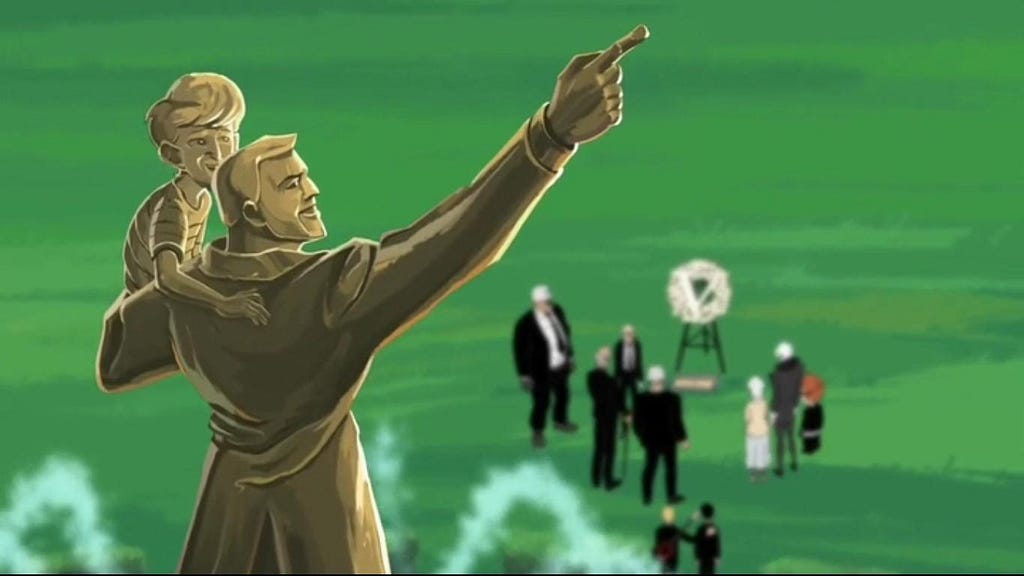
Serious Issues Taken Seriously (But Still Humorously)
The Dot and Line has previously covered one of the most powerful topics BoJack Horseman has tackled (and superbly so) to date: intergenerational trauma. Guess what? The Venture Bros. did it first. Doc Venture’s entire life is overshadowed by his father, Jonas Venture, Sr., who carelessly dragged young Rusty along on traumatizing escapades as a “boy adventurer” and bullied him mercilessly as a teenager, becoming what one character from the show called a “tormenter-rival.” Hank and Dean, Doc’s sons, got basically the exact same treatment—callous apathy mixed with outright mockery.
“It’s hard for me to toot my own horn, but I do think we were doing that before other people were, certainly for comedy or animation. But it was kind of natural,” Publick said. “Artists and comedians are all traumatized. And we’re making animation. We’re obviously all stuck in our own damn childhoods and trying to make sense of them. We’re all in a time loop. Life is Groundhog Day, except maybe on a five-year cycle, and maybe each time you get a little better at dealing with your crap, or you get one level deeper into understanding how you work, and what maybe needs fixing.”
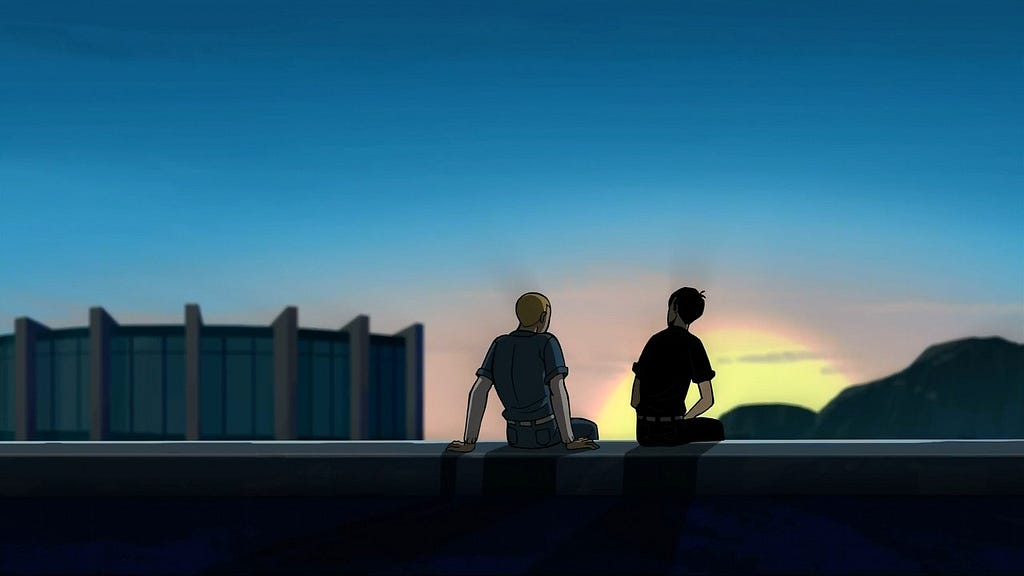
A Real Affection for the Characters
It’s become almost a cliché now for entertainment journalists to write about how evident it is that Publick and Hammer care about their characters. (“We’re setting ourselves up for a backlash, if we keep saying that,” Publick said.) Where other shows delight in torturing their characters—as did The Venture Bros. itself, in its early years, and as Rick & Morty does now—recent seasons of the show have shown an almost obvious affection for its lead characters in particular. Dean and Hank, the titular brothers (or so we think?) were once jokes. Now, their development matters. Once loathsome characters like their father, Doc Venture, have also grown, becoming a little softer and a little more understandable, and their relationships with other characters have, as a result, become almost heartwarming—typically anathema for a show with such a sharp edge.
Publick said the characters always mattered to him, at least insofar as how to make them funny or more interesting, or how to make a character as ridiculous as possible to allow experimentation with plot. But as for developing real connections with his characters, he called it a “gradual thing, where more stories started coming out of what we needed the character to start doing. What is this character’s reaction to what we’ve just had happen in the previous season. Let them sort of lead us to the next plot point.” That is, they began to include, alongside episodes that are “big idea/joke/adventure–driven,” episodes that asked, for instance, “what do I need Doc to do? Because any person in their right mind should be all fucked up from what we just did to him.”
Publick also eventually realized, with Hammer, that they “could actually be a little emotional without having to be ironic or jokey about it on purpose. Certainly, early on, we would wrap things up with a fake morality lesson, or have Dean have a sentimental moment about something, and even with the music, we would do a kind of ‘Very Special Brady Bunch’ cue to say, ‘Well, we know we’re being a bit mawkish here, or whatever.’ Now we can actually do it.” He added: “Season Three is when I thought we really opened up the most. When we allowed ourselves to bring some actual emotions in, because they were there, because we were maybe to young and embarrassed about ourselves to be earnest.”
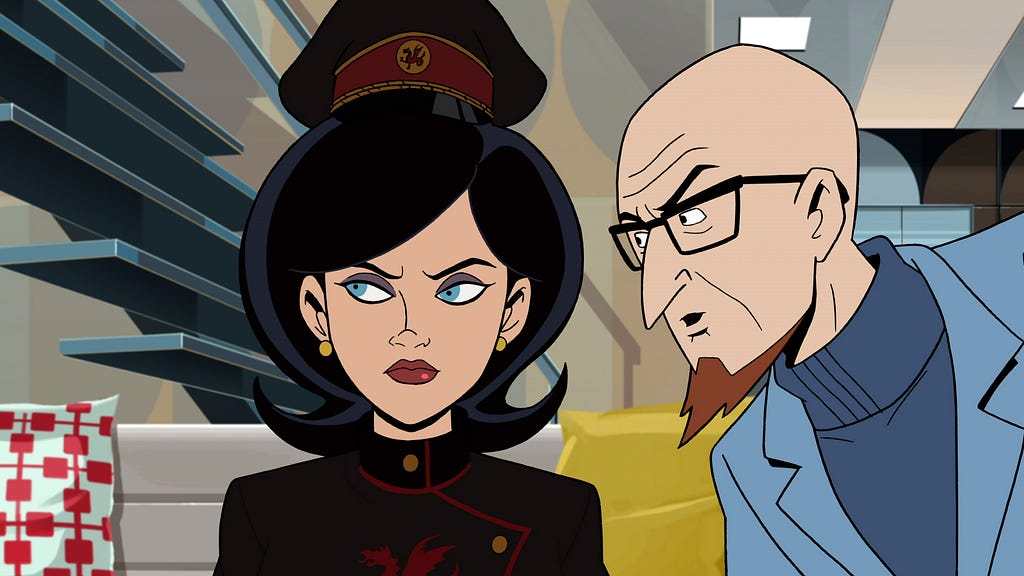
A Toxic Masculinity We Can’t Ignore (And Its Creators Can’t, Either)
When the show gets flack, it typically gets flack for how testosterone-fueled it is—just like its spiritual successor, Rick & Morty. And it’s a fair criticism—the show is, at its core, about a bunch of white boys LARPing as action figures who refuse to grow up, and who do all sorts of damage to themselves and each other in the process. The hope, Publick said, is that the audience understands that that’s the whole point. (Hence characters like Dr. Girlfriend, whose super-competence puts them in their place—albeit while being voiced by Hammer, a man.)
“That was always part of the joke, is that all of our characters are adolescent boys who grew up without mommies and wives, or even sisters, for the most part. And this is about them not knowing how to handle the world and perpetuating this stupid playing-cops-and-robbers world of theirs,” Publick said. “I think as I get older and as we shed more and more of the original jokes of the show and try to make it more and more relevant, or try to evolve our characters and our own writing, we bring other characters in. But it is mostly still a dopey boys’ world, and it’s going to be told from their perspective. If I were a better writer….” He trails off, adding: “Also, we’ve closed off our own personal world. We’re two dudes who write this show, and we’re the only ones who write it. So we’re going to have some blind spots: not so great at some things, better at others, and trying to grow.”
Thanks for reading The Dot and Line, where we talk about animation of all kinds. Don’t forget to for this article and follow us on Twitter and Facebook.


